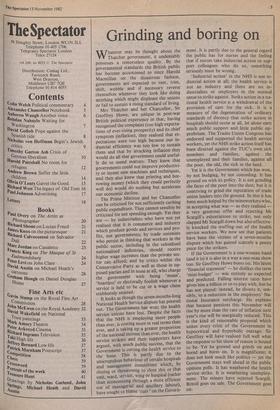Grinding and boring on
Whatever may be thought about the Thatcher government, it undeniably possesses a remorseless quality. By the
governmental standards the British public has become accustomed to since Harold Macmillan set the disastrous fashion, governments are expected to veer, trim, shift, wobble and if necessary reverse themselves whenever they look like doing anything which might displease the unions or fail to sustain a rising standard of living.
Mrs Thatcher and her Chancellor, Sir Geoffrey Howe, are unique in post-war British political experience in that, having recognised the complaint (too high expecta- tions of ever-rising prosperity) and its chief symptom (inflation), they realised that esc- pectations were too high because our in- dustrial efficiency was too low to sustain them and that by attacking inflation they would do all that government could useful- ly do to mend matters. They knew that governments could not improve productivi- ty or invent new machines and techniques, and they also knew that printing and bor- rowing money (which they could perfectly well do) would do nothing but accelerate our economic decline.
The Prime Minister and her Chancellor can be criticised for not sufficiently curbing public expenditure. They cannot sensibly be criticised for not spending enough. Yet they are — by industrialists who have not yet realised that it is commerce and industry which produce goods and services and pro- fits, not governments; by trade unionists who persist in thinking that workers in the public sector, including in the subsidised nationalised industries, should receive higher wage increases than the private sec- tor can afford; and by critics within the Conservative Party as well as those in op- posed parties and in none at all, who charge the government with being 'mean', 'heartless' or electorally foolish whenever a service is held to be cut or a wage claim stubbornly resisted. It looks as though the seven-months-long National Health Service dispute has petered out. The Government has won; the health service unions have lost. Despite the facts that the NHS is employing more people than ever, is costing more in real terms than ever, and is taking up a greater proportion of the national income than ever, the health service strikers and their supporters have argued, with much public success, that the Government is cutting the health service to the bone. This is partly due to the unscrupulous behaviour of certain hospitals and management committees which, by closing or threatening to close this or that unit, ward, service, wing or hospital (rather than economising through a more efficient use of managerial and ancillary labour), have sought to blame 'cuts' on the Govern- ment. It is partly due to the general regard the public has for nurses and the feeling that if nurses take industrial action or sup- port colleagues who do so, something seriously must be wrong.
`Industrial action' in the NHS is not in- dustrial action at all; the health service is not an industry and there are no in- dustrialists or employers in the normal sense to strike against. Strike action in a na- tional health service is a withdrawal of the provision of care for the sick. It is a measure of the degeneration of ordinary standards of decency that strike action in hospitals should occur at all, let alone earn much public support and little public op- probrium. The Trades Union Congress has endorsed and supported the health service workers, yet the NHS strike action itself has been directed against the TUC's own sick members and families, against the unemployed and their families, against all the poor, the old, the sick in the land.
Yet it is the Government which has won, by not budging, by not conceding. It has ground on with its policy. It is not grinding the faces of the poor into the dust; but it is contriving to grind the reputation of trade union leaders into the ground. In this it has been much helped by the mineworkers who, in accepting what was — as they realised a very generous offer and rejecting Mr Scargill's exhortations to strike, not only slapped Mr Scargill down but also effective- ly knocked the stuffing out of the health service workers. We now see that patients have been the victims of a seven-months dispute which has gained scarcely a penny piece for the strikers.
If the Government is a one-woman band (and it is) it is also in a way a one-man show too. Sir Geoffrey Howe bores on. His latest 'financial statement' — he dislikes the term 'mini-budget' — was entirely as expected and predicted. Falling interest rates have given him a billion or so to play with, but he has not played: instead, he diverts it, sen- sibly, to a reduction in the employers' Na- tional Insurance surcharge. He explains that because pensions this November will rise by more than the rate of inflation next year's rise will be marginally reduced. This is the kind of reasonable proposal which unites every critic of the Government in hypocritical and hyperbolic outrage. Sir Geoffrey will have realised full well what the response to his show of reason is bound to be. Yet he ground and grinds on and bored and bores on. It is magnificent; it does not look much like politics — yet the Government stays well ahead in the public opinion polls. It has weathered the health service strike. It is weathering unemploy- ment. The miners have rejected Scargill. Britoil goes on sale. The Government goes on.














































 Previous page
Previous page